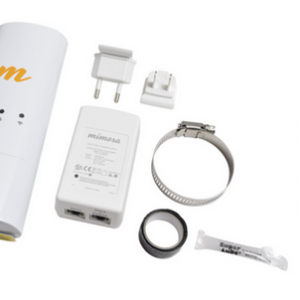رادیو وایرلس میموسا B5c یکی از رادیو های نقطه به نقطه یا به اصطلاح PTP شرکت Mimosa می باشد.
معرفی رادیو وایرلس میموسا Mimosa B5C
رادیو میموسا b5c یکی از چند رادیو قوی برای استفاده در مسافتهای طولانی و در حالت PTP میباشد. میموسا b5c این امکان را برای کاربر فراهم میآورد که پس از نصب توسط سرویس ابری میموسا روی اکسس پوینت نظارت داشته باشد. از این رادیو میتوان در شبکههای وایرلس بیرونی که به تبادل حجم زیادی از اطلاعات نیاز دارند برای آنتندهی به مناطق دوردست در تاورهای (ساختمان های بلند مرتبه) پخش کننده اینترنت که نسبت به آنتنهای مرکزی فاصله زیادی دارند و همچنین برای عملیاتهای امنیتی استفاده کرد.
FCC Part 15.407 and Part 90Y, IC RSS210 and RSS111, CE, ETSI 301 893/302 502 
در کاربردهایی با برد کوتاه، متوسط و بلند و همچنین در کاربردهای حساسی چون انتقال صدا و ویدئو نیز بسیار کارآمد خواهد بود. با توجه به این که این دستگاه فاقد آنتن داخلی است برای استفاده از آن به آنتنهای دو قطبی یا به اصطلاح (Dual Polarization) که به وسیله پیگتیلهای مدل Female Type N به یکدیگر متصل میشوند نیاز دارید.
قابلیتهای رادیو وایرلس میموسا B5C
علاوه بر این مدولاسیون آن ۴×۴:۴ MIMO میباشد. این فناوری سبب کاهش نقاط کور موجود شده، پهنای باند ارتباطی را افزایش داده و موجب بهبود پوشش و برد شبکه بیسیم میشود.
پشتیبانی از پروتکلهای وایرلس TDMA و TDMA-FD دسترسی چندگانه تقسیم زمانی (TDMA) که یک پروتکل قطعی است. این قابلیت سبب میشود به هر دستگاه یک شکاف زمانی اختصاص داده شود که در طی آن مجاز به ارسال است. همچنین اجازه میدهد تا رادیوهای ادغام شده از کانالهای همانند استفاده کنند و مانع از برخورد و تداخل Tx/Rx شوند. از طرفی برای حفظ قابلیت اطمینان لینک بالا در محیطهای متراکم ۵ گیگاهرتز، TDMA يک فرکانس کرير خاص را بين چندين کـاربر بـه اشتراک ميگذارد و هر کاربر از تايم اسلاتهايي کـه هيچگونـه تداخلی ندارند استفاده میکند. این حالت برای کانالهای با پهنای ۲۰/۴۰/۸۰ MHz قابل اجرا است.
قابلیت Auto Everything سبب میشود تا سیستم به صورت خودکار بهترین لینک را برای برقراری ارتباط انتخاب نماید که شامل پارامترهایی از قبیل تنظیم فرکانس، تنظیم پهنای باند و تنظیم سطح توان سیگنال ارسالی دستگاه بر اساس بازخوردهای محیط انتشار میشود. همچنین این امکان را به شما میدهد تا بتوانید یکسری از پارامترها مانند توان آنتن و …را ویرایش داده و تغییر دهید.
قابلیت Spectrum analysis نیزعلاوه بر مشخص کردن وضعیت کنونی ارتباط شما، آلودگی فرکانسی محیط را مورد تجزیه و تحلیل قرار داده و در جدولی داینامیک و پویا در اختیار اپراتور قرار میدهد.
قابلیت دیگر این دستگاه استفاده هم زمان از دو کانال ارسال و دریافت اطلاعات است. ویژگی Dual Link که در رادیو میموسا مدل b5c وجود دارد سبب می شود Load balancing به راحتی اجرا شود و در ارتباط برقرار شده تداخل را به کمترین میزان ممکن برساند. بدین روش که اگر در کانالی که ارتباطی برقرار شده است تداخل احساس شود، همزمان با برقراری ارتباط رادیو به دنبال پیدا کردن کانال جایگزین میگردد. این کار موجب میشود که در محیط های پر ازدحام بتوان پهنای باند را با همان نرخ انتقال داده در دو کانال تقسیم کرد و همان میزان دادهها را انتقال داد.
همچنین این دستگاه از سامانه ماهوارهای ناوبری جهانی (GNSS) نوع GPS و GLONASS پشتیبانی میکند. با استفاده از GPS یا GLONASS استاندارد برای همزمانی (Sync) زمان ارسال و دریافت چنان با دقت تنظیم میشود که میزان تداخل به کمترین حد خود کاهش مییابد.
قیمت رادیو وایرلس میموسا Mimosa B5C
قیمت رادیو وایرلس میموسا مدل MimosaB5C با توجه به امکانات و کاربردهای بیشماری که دارد مناسب بوده و شما میتوانید این دوربین را با بهترین قیمت از سایت فروشگاه سپهر تهیه نمایید و درصورت نیاز به مشاوره با کارشناسان ما در واحد فروش تماس حاصل فرمایید. لازم به ذکر است در سایت فروشگاه سپهرجهت رفاه حال شما مشتریان گرامی امکان پرداخت مبلغ سفارش با تمامی کارتهای عضو شبکه شتاب نیز وجود دارد.
 فروشگاه تجهیزات شبکه ،کامپیوتر و سیستم های حفاظتی نظارتی | شبکه – سیستم های حفاظتی و نظارتی
فروشگاه تجهیزات شبکه ،کامپیوتر و سیستم های حفاظتی نظارتی | شبکه – سیستم های حفاظتی و نظارتی







هیچ دیدگاهی برای این محصول نوشته نشده است.